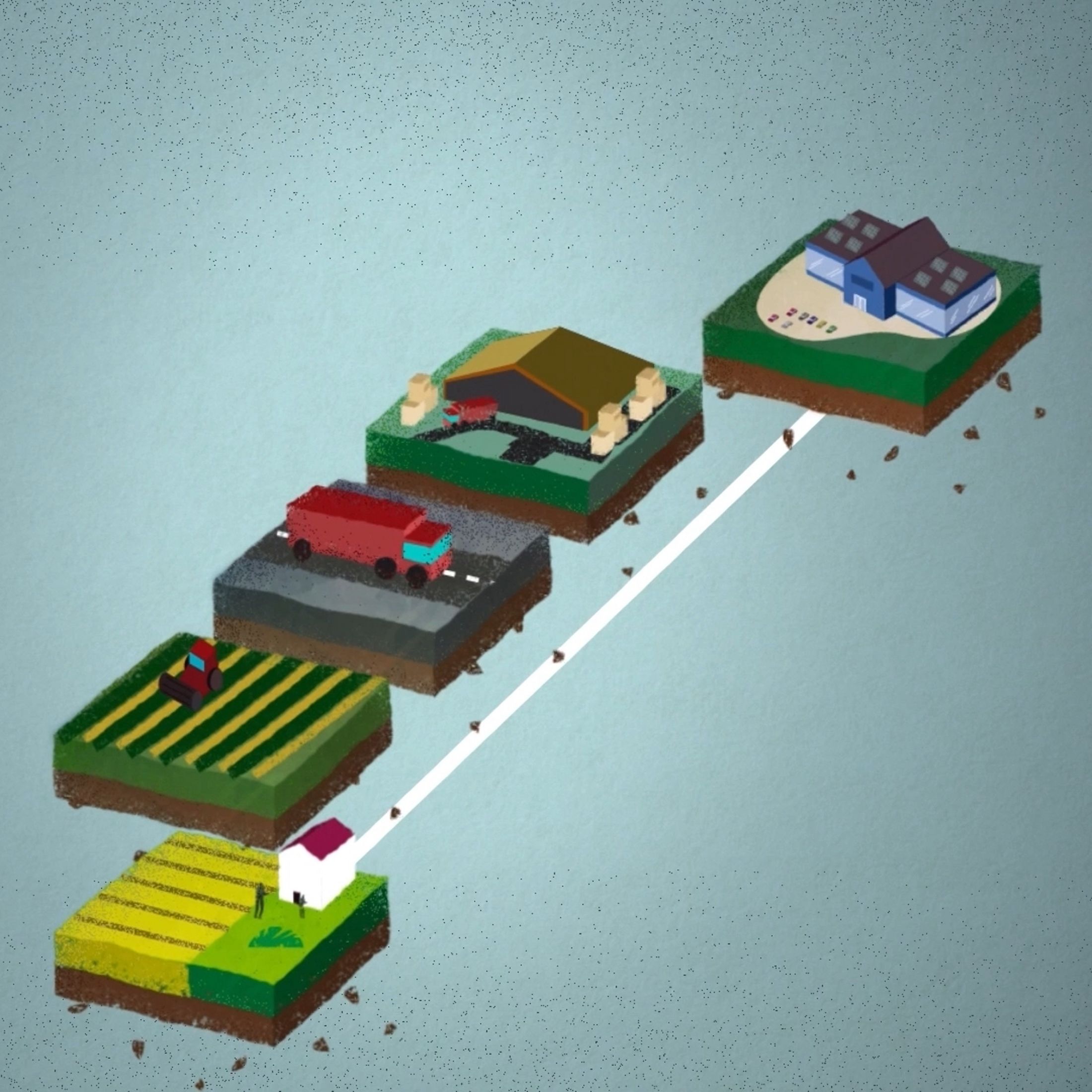
Farming for Strong Markets and a Sustainable Future
How Natural Climate Solutions are a Win-Win for Agri-businesses
All businesses have a vital role in ensuring climate targets are met by the end of this decade. Our research shows that the agriculture sector represents one of the biggest opportunities for reducing greenhouse gas emissions through Natural Climate Solutions in Canada.
There is no doubt that there are a huge number of environmental benefits in adopting agricultural practices that have ecological benefits, also known as regenerative agriculture. What is less discussed are the many social and economic benefits of transitioning to these regenerative techniques. Investing in these approaches can both support producers and secure sustainability outcomes for businesses, while also protecting the planet.
Why the Urgency?
Deadlines to achieve global and national targets to slow warming to 1.5 degrees Celsius are looming ever closer. According to the Paris climate agreement, greenhouse gas emissions must peak before 2025 and decline 43% by 2030 to avoid the worst impacts of climate change and biodiversity loss. Canada’s national 2030 Emissions Reduction Plan calls for 40% reduction below 2050 levels — including specific targets for Natural Climate Solutions and the agriculture sector — on the way to net-zero by 2050. Alongside these targets, Canada has also committed to protecting 30% lands and waters by 2030, including rich carbon stores, such as grasslands where ranchers graze their cattle.
In order to support our economy’s transition to net zero, we need agri-businesses to make investments now and use their collective influence to support producers in increasing Natural Climate Solutions in this critical sector.
Quote: Leah Blechschmidt

Agribusiness is increasingly committed to reducing greenhouse gas emissions. Natural Climate Solutions have the potential to realize these goals while providing economic resilience, water quality and other co-benefits.
The Valuable Opportunities for Agriculture
Leading agri-businesses across Canada have already begun to set ambitious, science-based emissions-reduction targets and are working to develop products and services that are more sustainable. At the same time, producers who grow the crops and raise the livestock that feed our communities face serious barriers to adoption, including real and perceived financial risks of these regenerative practices. By mobilizing local, growing networks, agri-businesses and governments, we can develop solutions to overcome these barriers, while keeping the Canadian agricultural sector competitive.
And in some cases, it’s possible to generate additional income from Natural Climate Solutions, which draw on the power of nature to help reduce emissions, remove carbon dioxide from the atmosphere and store it in natural systems. The time to make the shift is right now if we are to achieve the scale of change needed.
Natural Climate Solutions yield both financial and environmental benefits, such as improving soil health, which leads to healthier crops.
The Win-Win Natural Climate Solutions
A study led by Nature United in 2021 identified more than 30 nature-based pathways that can be tailored for the right context and sector, benefitting people, supporting rural economies and reducing greenhouse gases.
For Canadian growers, Natural Climate Solutions, such as no-till or reduced tillage practices — which avoid or minimize the use of practices that disturb soils in the planting process — are already being adopted by many, with over half of all agricultural lands in Canada using such techniques. These practices yield both financial and environmental benefits, such as improving soil health by returning carbon back to the soil where it is retained. Healthier soil leads to healthier crops.

Practices such as cover crops and the rotation of legumes have had a lower uptake to date, and that’s where collectively the agri-business can focus its energies
Another promising pathway is agroforestry, which involves planting rows of trees among crop and hay lands. Trees sequester carbon and provide habitats for wildlife, while roots can help reduce soil erosion, keeping soil on the field. And less erosion means fewer crops lost, and more financial security for producers.
Achieving a sustainable, profitable and climate-positive agricultural sector is possible.
Pathways for Supporting Natural Climate Solutions Today
While there are actions that producers can take now to reduce greenhouse gas emissions ahead of 2030, they cannot make this shift to regenerative practices alone. Agri-businesses have a vital role to play in supporting Canadian producers to adopt Natural Climate Solutions across their operations. Here are five ways to do so:

1. Risk Sharing
Changing practices can be risky for producers due to high economic and environmental uncertainties. Agri-businesses, governments, investors and insurance companies must share that risk by establishing new incentives, products and services to promote the adoption of sustainable agriculture practices in individual value chains. Companies can also support this by participating in multi-stakeholder initiatives, engaging their industry peers, suppliers and buyers in their sustainability strategies and committing financial resources to address risk.

2. Broadening Access to Technical Resources
Producers typically receive advice about plant productivity, nutrient management and pest control. While these issues are critical, they fall short of helping producers understand the benefits of regenerative practices and balance climate, productivity and sustainability goals. Canadian agri-businesses must provide producers with evidence-based advice and incentives so they can better understand the environmental and economic opportunities of climate-resilient business decisions. Farmer-to-farmer training can often be the best mechanism for disseminating knowledge, especially when selecting opportunities that are best suited for their localized operations.

3. Investing in Research and Technology
A recent study by Bain & Company and Nature United suggests that producers adopting practices such as reduced tillage and nutrient management may experience two seasons of yield loss before breaking even around the fourth season and reaching profitability by the fifth or sixth season. To have the confidence to select and adopt practices that are best suited to their operations, producers need evidence on the agronomic and economic feasibility and associated environmental benefits of sustainable practice. Businesses are well-placed to support research efforts. Alternately, investments in technology funds, such as the THRIVE Canada Accelerator, can help to innovate and create new technology that will be needed for the carbon transition, including funding for new equipment needed for new practices or increase farm efficiency.
Quote: Les Fuller
How do we move to a profitable and climate-positive agricultural sector? It starts with collaboration between producers and businesses across the supply chain. Together we can create measures to track and report on this progress.

4. Supporting Effective Policies
Businesses can advocate for policies that promote Natural Climate Solutions and reduce barriers for producers. Businesses offer a unique and critical perspective, as well as being able to implement changes at scale. By working with producers and suppliers to understand the barriers they are facing, businesses can advocate for policy change. Working with organizations such as Nature United can also bolster science, scaled approaches and policies that support regenerative agriculture.

5. Collaborating for Measurable Impact
As more agri-businesses set sustainability targets for climate and nature, they need robust ways to measure progress. Collaborative approaches to measuring, verifying and reporting against the adoption of Natural Climate Solutions can improve standards across an entire supply chain, where a product’s lifespan can be thoroughly tracked against measurable claims and transparent, science-based targets. Already, collaborations in Canada are accelerating regenerative practices at the regional, national and international levels, creating opportunities to work more effectively with land owners and managers, producers and Indigenous communities.
Businesses can Help the Planet — and Stay Competitive — by Making Climate Commitments
In light of the targets set for businesses at COP15, the private sector now has a clear path forward to be a force for change. Through collaboration, businesses can lead meaningful corporate commitments that last — but only if action happens now.
The scale of corporate operations, combined with partnerships with producers, governments and Indigenous Nations and communities, can combine to meet climate goals while protecting and restoring ecosystems across Canada — and beyond.
Join Us
The facts are clear: Canada will not achieve net zero by 2050 without greater investment and adoption of Natural Climate Solutions.
Are you ready to implement effective, value-chain solutions that result in real change for climate and nature? Do you want to collaborate and innovate for better outcomes for people, nature and climate? Nature United brings decades of global expertise working with partners on a wide range of climate solutions, from emission reductions to policy solutions. We’d like to work together to achieve these goals. Contact us to find out more.


